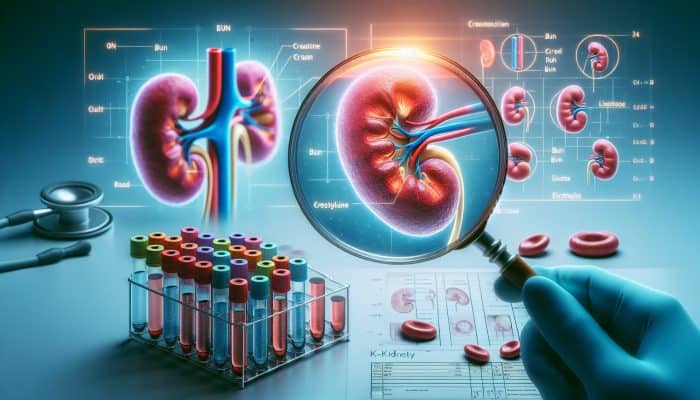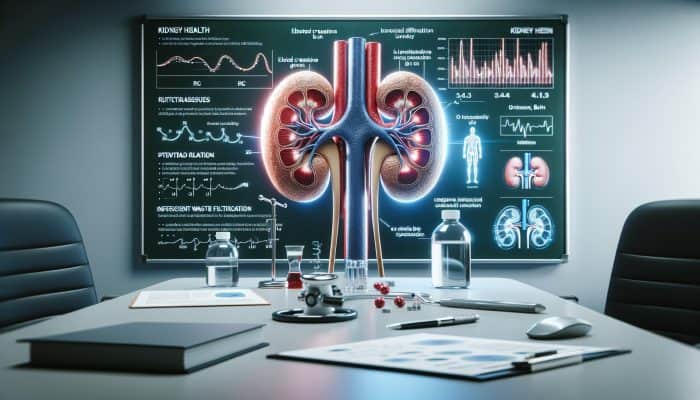Comprehensive Guide to Kidney Blood Testing for Optimal Health Management
Understanding the Significance of a Kidney Blood Test

A kidney blood test serves as a crucial diagnostic tool that evaluates the efficiency of your kidneys by measuring specific substances present in your bloodstream. This vital assessment focuses on essential indicators such as creatinine, blood urea nitrogen (BUN), and critical electrolytes such as sodium and potassium. By thoroughly analyzing these key components, healthcare professionals can obtain significant insights into kidney functionality, which is imperative for the early detection of potential health issues. This routine evaluation is especially important for individuals with a higher susceptibility to kidney disease, facilitating proactive health management and timely intervention.
The kidneys are integral to numerous bodily functions, including the filtration of waste products from the blood, the regulation of fluid balance, and the maintenance of the body's electrolyte levels. Therefore, comprehending the outcomes of a kidney blood test is essential for effective health management. Typically performed in various healthcare environments—from large hospitals to private clinics—this straightforward procedure involves collecting a small blood sample. Despite its simplicity, the implications of this test for diagnosing and tracking kidney health are profound and far-reaching.
Determining the Ideal Frequency for Kidney Health Testing
The frequency with which individuals should undergo kidney blood tests can vary greatly based on personal health profiles and risk factors. For those diagnosed with conditions such as diabetes or hypertension, regular testing becomes vital for closely monitoring kidney function. Healthcare providers typically recommend annual or biannual testing for at-risk patients, whereas individuals without significant health concerns may find it sufficient to test every few years. Your healthcare provider will take into account your medical history, lifestyle choices, and any current symptoms when establishing a suitable testing schedule.
If you are experiencing symptoms like fatigue, swelling, or alterations in urination patterns, it may be prudent to increase the frequency of your testing. Ongoing monitoring is crucial not only for the early detection of potential kidney complications but also for evaluating the effectiveness of any treatments should health issues arise. Working collaboratively with your healthcare provider to create a personalized testing schedule is essential for maintaining optimal kidney health and overall well-being.
Essential Preparation Steps for Your Kidney Blood Test
Proper preparation for your kidney blood test is key to ensuring accurate results. Depending on the specific tests requested, fasting may be necessary prior to the blood draw. Generally, fasting entails refraining from all food and beverages—except for water—for a duration of 8 to 12 hours before the test. Additionally, it may be required to temporarily stop taking certain medications, vitamins, or supplements, making it crucial to communicate openly with your healthcare provider about any substances you are currently consuming.
Other preparatory actions may include ensuring that you are well-hydrated since adequate hydration can facilitate blood collection and improve sample quality. It is also advisable to avoid strenuous exercise and alcohol consumption in the days leading up to your test, as these factors can impact your results. By diligently adhering to your healthcare provider's instructions, you can ensure the most precise assessment of your kidney function and health status.
Interpreting Your Kidney Blood Test Results: What You Need to Know

The results from your kidney blood test provide vital insights into your kidney health. Abnormal levels of the substances evaluated can signal a range of underlying health issues. For example, elevated levels of creatinine might indicate that your kidneys are struggling to filter waste effectively, while increased BUN levels could suggest dehydration or potential kidney dysfunction. It is essential to understand that these results should not be analyzed in isolation; they must be interpreted alongside your medical history, symptoms, and possibly additional diagnostic evaluations.
A qualified healthcare professional will assist you in comprehending your results, explaining the significance of each marker in relation to your health. Common interpretations of test results include:
- Creatinine: Elevated levels may suggest compromised kidney function.
- BUN: Increased levels can indicate kidney dysfunction or dehydration.
- Electrolytes: Imbalances may signify kidney or metabolic disorders.
- GFR: A reduced glomerular filtration rate indicates diminished kidney performance.
Understanding the implications of these results is crucial for timely intervention and appropriate health management when necessary.
Diverse Types of Kidney Blood Tests: What to Expect
There are multiple types of kidney blood tests, each focusing on distinct aspects of kidney function. The most commonly performed tests include serum creatinine, blood urea nitrogen (BUN), and the glomerular filtration rate (GFR) test. Familiarizing yourself with these tests empowers patients to make informed decisions regarding their health and treatment options.
The serum creatinine test measures the concentration of creatinine in the blood, providing insights into how well the kidneys filter this waste product. The BUN test evaluates the nitrogen content in the blood originating from urea, a waste material produced during protein metabolism. Lastly, the GFR test estimates how effectively your kidneys filter blood, offering a comprehensive view of overall kidney function.
Each of these tests is valuable for monitoring kidney health, particularly for individuals with risk factors such as diabetes or hypertension. A healthcare provider can help determine which tests are most appropriate based on your unique health profile and existing medical conditions.
Accessing Kidney Blood Testing Services in Chesterfield
Finding Local Hospitals Offering Kidney Blood Tests

Residents in Chesterfield have access to various local hospitals that provide kidney blood tests. The Chesterfield Royal Hospital is a leading facility offering comprehensive diagnostic services, including thorough evaluations of kidney function. Patients are encouraged to verify the availability of these services and to schedule appointments in advance to minimize wait times.
Local hospitals typically feature dedicated laboratories staffed by skilled technicians who ensure accurate and timely analyses of test samples. When visiting a hospital for your kidney blood test, it is advisable to bring identification and any necessary medical referrals. Additionally, checking whether the hospital provides online booking can enhance convenience for patients.
Besides hospitals, other healthcare facilities in Chesterfield also offer kidney blood testing services. It is prudent to research the specific offerings at each location to select one that best meets your testing needs.
Advantages of Private Clinics for Kidney Blood Tests in Chesterfield
For individuals seeking prompt access to kidney blood tests, private clinics in Chesterfield provide an excellent alternative. These clinics often offer services with shorter waiting times compared to public hospitals. Many private facilities cater to patients looking for quick testing and results, which can be particularly beneficial for individuals managing chronic health conditions.
While some private clinics may accept walk-ins, others might necessitate a referral from your GP for specific tests. It’s advisable to review the clinic’s website or contact them directly to clarify their procedures and any required documentation.
These clinics often create a comfortable, patient-centered environment, ensuring that individuals feel at ease during their testing experience. Moreover, the flexible scheduling options can accommodate the busy lifestyles of many patients, making it easier to prioritize their health needs.
Services Offered by GP Surgeries for Kidney Blood Testing
Numerous GP surgeries in Chesterfield are equipped to conduct kidney blood tests, providing a convenient option for residents. These surgeries facilitate routine monitoring of kidney health, particularly for individuals with risk factors or patients on medications that may impact kidney function.
Typically, during a standard appointment, your GP can evaluate your health status and determine if a kidney blood test is warranted. The test can often be performed on-site, with results available within a few days. This streamlined process allows for timely follow-ups and interventions when necessary.
Patients are encouraged to openly discuss any symptoms or concerns related to their kidney health with their GP. Such transparency fosters a proactive healthcare approach, ensuring that patients receive appropriate monitoring and personalized care tailored to their specific health needs.
Enhancing Access to Kidney Blood Testing Through Mobile Health Services
In Chesterfield, mobile health services provide a convenient and innovative approach to kidney blood testing, delivering essential services directly to patients’ homes. This option is especially beneficial for individuals with mobility challenges or those who prefer to avoid hospital settings. Mobile health providers typically offer a variety of diagnostic tests, including kidney blood tests, in community settings or at the patient's residence.
Patients utilizing these services can expect a professional and efficient experience, with trained healthcare personnel conducting tests in a comfortable and familiar environment. To access mobile health services, patients can reach out to local providers to schedule appointments tailored to their convenience.
Utilizing mobile health services presents a more personalized approach to healthcare, ensuring that individuals remain engaged with their health needs without experiencing the stress associated with traditional hospital or clinic visits. These services also contribute to broader public health efforts by increasing accessibility and promoting widespread testing.
Expert Insights on Kidney Blood Tests in Chesterfield
Understanding What Your Test Results Reveal
Interpreting the findings from your kidney blood test can be complex, as results vary according to individual health circumstances. The numerical values obtained from the tests can provide insights into the functional status of your kidneys. However, comprehending these results necessitates expert guidance from a healthcare professional who can contextualize the numbers based on your medical history, age, and other relevant health factors.
Common test results typically fall within established reference ranges, with deviations potentially indicating various health issues. For example, a serum creatinine level that exceeds the normal range may signify compromised kidney performance, while abnormal BUN levels could suggest other underlying health conditions.
Your healthcare provider will assist in interpreting results and may offer common explanations such as:
- Creatinine: Elevated levels may indicate renal impairment.
- BUN: Increased levels could suggest kidney dysfunction or dehydration.
- Electrolyte Imbalances: Abnormalities may indicate metabolic issues.
- GFR: A reduced GFR indicates decreased kidney performance.
Having a clear understanding of your results is vital for making informed health decisions and planning any necessary treatments moving forward.
Essential Steps to Take If Your Results Are Abnormal
If your kidney blood test results are abnormal, it is imperative to follow up with your healthcare provider for further testing or consultation. Abnormal results can indicate a range of potential health issues, from mild to severe, so prompt follow-up is essential for effective management. Your physician may recommend additional tests or imaging studies to clarify the situation and outline an appropriate course of action.
Actionable steps for patients receiving abnormal results include:
- Consult with your healthcare provider to discuss the implications of the results.
- Request further testing if recommended to clarify any uncertainties.
- Consider lifestyle modifications that may enhance kidney function, such as dietary changes.
- Stay informed about your condition by seeking educational resources and support.
Taking proactive measures will help you navigate your health concerns effectively while collaborating closely with your healthcare team to achieve the best possible outcomes.
Recognizing the Importance of Kidney Specialists in Your Care
Nephrologists, or kidney specialists, are instrumental in managing kidney health, particularly when kidney blood test results indicate potential dysfunction. These professionals possess extensive training in diagnosing and treating kidney diseases, allowing them to formulate tailored treatment plans based on individual test results.
Patients should consider consulting a nephrologist if they receive abnormal test results or if they have significant risk factors for kidney disease, such as diabetes or hypertension. A specialist can perform a comprehensive evaluation, recommending further diagnostic tests, lifestyle changes, or specific medications as needed.
Their in-depth knowledge of kidney function enables nephrologists to provide targeted management strategies, potentially leading to significantly improved health outcomes. Engaging with a kidney specialist can also provide peace of mind, ensuring that patients receive dedicated care focused on their specific health needs.
Best Practices for Preparing for Your Kidney Blood Test
To ensure accurate results from your kidney blood test, proper preparation is essential. Here are key steps to consider before your test:
- Stay well-hydrated, as good hydration enhances the quality of the blood sample.
- Avoid certain medications, especially those affecting kidney function, as advised by your doctor.
- Inform your healthcare provider about any supplements or vitamins you take regularly.
- Consider pausing consumption of high-protein foods or alcohol before the test, if recommended by your healthcare provider.
Following these steps can significantly improve the accuracy of your test results. Always consult your healthcare provider regarding specific requirements tailored to your situation. Taking these precautions demonstrates a proactive approach to your kidney health and ensures you receive the most reliable information for ongoing health management.
Key Advantages of Kidney Blood Testing
Early Detection of Kidney Disease for Improved Health Outcomes
One of the most significant benefits of kidney blood testing is its ability to identify kidney disease at an early stage in its progression. Early detection is crucial as it allows for timely intervention and management, which can significantly enhance patient outcomes. For example, recognizing elevated creatinine levels before they escalate into advanced disease can prompt necessary lifestyle changes or medical treatments that may prevent further decline in kidney function.
Regular testing facilitates the early identification of at-risk individuals, enabling healthcare providers to proactively monitor kidney health. For those with existing conditions such as diabetes, hypertension, or a family history of kidney disease, routine blood tests can serve as a vital tool for early intervention. When kidney issues are identified early, it can lead to improved overall health and reduced healthcare costs in the long term.
Continuous Monitoring of Kidney Function for Individuals at Risk
For individuals with chronic conditions or those at risk of kidney disease, regular kidney blood testing is essential for continuous monitoring. This consistent assessment allows healthcare providers to track changes in kidney function over time, enabling necessary adjustments to treatment plans.
Common conditions that necessitate ongoing kidney monitoring include:
- Diabetes: High blood sugar levels can gradually damage the kidneys and impair their function.
- Hypertension: Elevated blood pressure can put stress on the kidney's blood vessels, impairing their function.
- Heart Disease: The interconnectedness of heart and kidney health means cardiovascular issues can also affect renal function.
- Obesity: Increased body weight can negatively impact kidney function and heighten the risk of disease development.
With consistent monitoring, healthcare providers can intervene more effectively, making necessary adjustments to treatments or suggesting lifestyle changes that promote kidney health.
Evaluating Treatment Effectiveness Through Kidney Blood Testing
For patients undergoing treatment for kidney-related issues, kidney blood tests are crucial for assessing the effectiveness of therapies. Regular testing enables healthcare providers to evaluate the success of a treatment plan and determine if any modifications are needed. For instance, if a patient is taking medication for hypertension, periodic kidney blood tests can help ascertain whether kidney function is improving or if further adjustments are warranted.
By analyzing the outcomes of kidney blood tests, healthcare professionals can make informed decisions about continuing, modifying, or changing treatment approaches. This ongoing assessment not only enhances patient care but also ensures optimal health outcomes by tailoring treatments to meet individual patient needs.
Understanding the Process of a Kidney Blood Test
A Step-by-Step Overview of the Kidney Blood Testing Procedure
The procedure for obtaining a kidney blood test is typically straightforward and involves several key steps. Initially, a healthcare professional will prepare the patient for the blood draw by cleaning the area on the arm where the blood will be taken. Here are the primary steps involved in the testing process:
- Identification: Confirming the patient’s identity and explaining the procedure to ensure understanding and consent.
- Preparation: Cleaning the blood draw site with an antiseptic to minimize the risk of infection.
- Sample Collection: Drawing blood from a vein, usually in the arm, using a sterile needle.
- Sample Handling: Placing the blood sample in appropriate containers for laboratory analysis.
These steps are designed to ensure the accuracy and reliability of the test results. The entire process typically takes only a few minutes, and patients can resume their normal activities shortly thereafter. Understanding these procedures can help alleviate any anxiety associated with the test.
Key Substances Measured During Kidney Blood Tests
Kidney blood tests evaluate various substances that provide critical insights into kidney function. Key components assessed include creatinine, urea, and electrolytes.
– Creatinine is a waste product produced by muscles, and its level in the blood indicates how effectively the kidneys filter waste. Elevated levels typically signal impaired kidney function.
– Blood Urea Nitrogen (BUN) measures the amount of nitrogen in your blood that comes from urea, a waste product formed after protein digestion. High BUN levels may indicate kidney dysfunction or other health issues.
– Electrolytes are minerals in the blood that help regulate various bodily functions, including fluid balance and muscle contractions. Abnormal levels can indicate problems with kidney function or other metabolic disorders.
Understanding what substances are measured empowers patients to interpret their results more effectively and fosters informed discussions with healthcare providers regarding their kidney health.
Expected Timeline for Receiving Results from Your Kidney Blood Test
The time frame for receiving results from a kidney blood test can vary based on the laboratory processing the samples. Typically, patients can expect results within a few days; however, some facilities may offer expedited services that provide results within hours.
Once your blood sample is analyzed, your healthcare provider will reach out to discuss the findings. If abnormalities are detected, they may arrange follow-up appointments or additional testing to clarify the situation.
Being informed about the expected timeline for results can help reduce anxiety during the waiting period and enable patients to plan accordingly for any necessary follow-up care.
Research-Backed Advantages of Kidney Blood Testing in Chesterfield
Enhancing Patient Outcomes Through Routine Testing
Research consistently demonstrates that routine kidney blood testing among at-risk populations can significantly enhance health outcomes. For instance, early identification of kidney impairment allows for timely intervention, which can slow the progression of kidney disease and reduce the risk of complications such as renal failure.
Real-world examples illustrate the success of proactive kidney monitoring. Patients who undergo regular testing often experience better management of their conditions, leading to fewer hospitalizations and an overall improved quality of life.
Such advancements underscore the critical role that kidney blood tests play in public health, especially in communities facing high rates of diabetes and hypertension. By investing in regular testing, healthcare systems can enhance overall health outcomes and reduce long-term healthcare costs.
The Cost-Effectiveness of Early Detection Through Testing
One of the notable advantages of kidney blood testing is its cost-effectiveness in preventing severe health complications. Early detection of kidney disease through routine testing can significantly reduce the need for more expensive treatments later on, such as dialysis or kidney transplantation.
Studies suggest that early intervention can save the healthcare system substantial amounts of money by decreasing the need for hospitalizations and intensive treatments. For example, patients diagnosed and treated for kidney issues at earlier stages often require less aggressive (and costly) therapies compared to those identified at advanced stages of the disease.
This cost-saving aspect highlights the importance of routine kidney blood tests, especially for high-risk populations. Investing in regular testing not only yields long-term savings but also contributes to better health outcomes for both individuals and the healthcare system.
Strengthening Public Health Initiatives Through Kidney Testing
Kidney blood testing is a fundamental aspect of public health initiatives aimed at alleviating the burden of kidney disease within communities like Chesterfield. Programs focused on raising awareness and educating the public about kidney health encourage individuals to seek regular testing, resulting in early detection and management of potential health issues.
Healthcare authorities often implement campaigns designed to promote the importance of kidney health and the availability of testing services. By increasing awareness, these initiatives empower individuals to take charge of their health, encouraging proactive measures that prevent disease progression and enhance overall well-being.
Moreover, public health initiatives that offer free or subsidized testing can significantly boost community involvement, ensuring that individuals from diverse backgrounds have access to crucial kidney health assessments.
Raising Awareness and Education Regarding Kidney Health
Regular kidney blood testing plays a pivotal role in raising awareness and educating the public regarding kidney health. Through community outreach programs and health fairs, individuals can learn about the significance of kidney function and the risks associated with kidney disease.
Educational initiatives typically emphasize the importance of routine testing, particularly for those at risk. By enhancing knowledge surrounding kidney health, patients are more likely to engage in preventive measures and seek timely medical attention when needed.
This increased awareness contributes to a more informed community that prioritizes health, leading to better management of existing conditions and the prevention of future health issues.
How Kidney Blood Test Results Inform Personalized Treatment Plans
Results from kidney blood tests enable healthcare providers to tailor treatment plans to individual patient needs, significantly improving care outcomes in Chesterfield. By understanding specific markers and their relation to kidney function, healthcare professionals can develop customized treatment strategies that address unique health concerns.
For instance, if a blood test reveals imbalances in electrolytes, a healthcare provider can modify dietary recommendations or adjust medications as necessary. This personalized approach ensures that treatment is effective and aligned with the patient’s overall health objectives.
The ability to customize care based on test results fosters a collaborative relationship between patients and healthcare providers, enhancing patient satisfaction and adherence to treatment plans.
Essential Considerations for Kidney Blood Testing in Chesterfield
Factors to Evaluate When Choosing a Testing Facility
Selecting a reputable testing facility for your kidney blood test is crucial for obtaining accurate results. When evaluating a facility, consider several factors, including:
- Accreditation: Ensure the facility adheres to regulatory standards and certifications.
- Patient Reviews: Look for feedback from previous patients regarding their experiences at the facility.
- Location: Choose a facility that is conveniently located for your needs.
- Services Offered: Verify that the facility provides the specific tests you require.
By carefully assessing these criteria, you can select a facility that prioritizes quality care and accurate testing, ensuring that your kidney health is monitored effectively and that you receive the best possible medical care.
Steps to Take After Your Kidney Blood Test
After undergoing a kidney blood test, it’s essential to follow up with your healthcare provider to discuss the results and any necessary next steps. During your follow-up appointment, consider asking the following questions:
- What do my test results indicate about my kidney health?
- Are any further tests or referrals necessary based on the results?
- What lifestyle changes should I consider implementing based on my test outcomes?
- How frequently should I have my kidney function tested in the future?
Asking these questions can facilitate a productive discussion, ensuring you understand your health status and the actions required moving forward. Actively engaging in your healthcare promotes better health outcomes and empowers you to manage your kidney health effectively.
Strategies for Maintaining Optimal Kidney Health for Lifelong Wellness
To maintain good kidney health, incorporating healthy lifestyle choices into your daily routine is imperative. This includes making dietary adjustments, remaining physically active, and ensuring adequate hydration. A well-balanced diet rich in fruits, vegetables, and whole grains supports kidney function, while reducing salt and sugar intake can help manage blood pressure and blood sugar levels effectively.
Regular exercise is equally vital for overall health, as it enhances circulation and aids in maintaining a healthy weight. Aim for at least 150 minutes of moderate-intensity exercise each week. Staying well-hydrated is also crucial; consuming adequate water supports kidney function and helps flush out toxins from the body.
By adopting these practices, you can significantly decrease the risk of kidney disease and promote overall well-being. Taking proactive steps towards maintaining your kidney health is essential for long-term health success.
FAQs About Kidney Blood Testing: Answers to Common Questions
What substances are evaluated during a kidney blood test?
A kidney blood test evaluates various substances in your blood, primarily focusing on creatinine, BUN, and electrolytes, to assess kidney function and overall health.
How often should I have a kidney blood test performed?
The frequency of testing depends on individual health risks; for those with conditions like diabetes, annual or biannual testing is usually recommended, while others may only require testing every few years.
How can I effectively prepare for my kidney blood test?
Preparation involves fasting if instructed, maintaining proper hydration, and informing your healthcare provider about any medications or supplements you’re taking.
What do abnormal results from a kidney blood test indicate?
Abnormal results may suggest kidney dysfunction or other health issues; following up with your healthcare provider is essential for further evaluation.
Where can I obtain a kidney blood test in Chesterfield?
You can obtain a kidney blood test at local hospitals, private clinics, GP surgeries, or through mobile health services available in Chesterfield.
What is the typical turnaround time for kidney blood test results?
Results generally take a few days to arrive; however, some facilities may offer faster turnaround times for urgent cases.
What specific substances are evaluated in a kidney blood test?
Key substances include creatinine, BUN, and electrolytes, which provide critical insights into kidney function and overall health.
What advantages does regular kidney blood testing offer?
Regular testing facilitates early detection of kidney disease, continuous monitoring of kidney function, and evaluation of treatment effectiveness, leading to improved health outcomes.
How do kidney blood tests enhance patient care?
Routine testing allows for early intervention, resulting in better management of kidney conditions and a reduction in complications.
What lifestyle changes can promote better kidney health?
Adopting a balanced diet, staying hydrated, engaging in regular exercise, and managing blood pressure and blood sugar levels can significantly enhance kidney health.
Connect with us on Facebook!
This Article Was First Found On https://bloodtest.co.uk
The Article Kidney Blood Test: Your Local Guide in Chesterfield Was Found On https://limitsofstrategy.com

